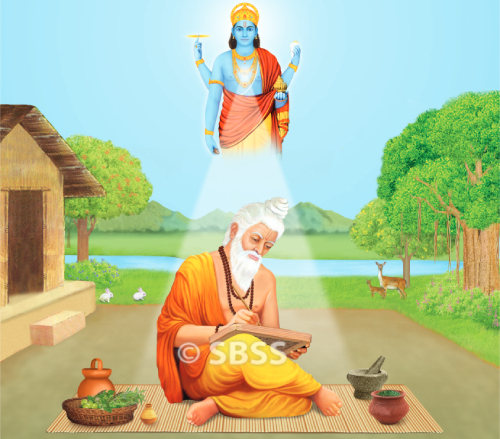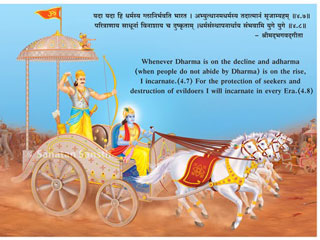Ayurveda for a healthy life ! – 24/2024

Janmabala Pravrutta Vyadhi (Congenital Anomalies)
Ayurveda describes many congenital anomalies that is Janmabalapravrutta vyadhi such as blindness (Aandhya), deafness (Badhirya), dumbness (Mooka), congenital hernia (Vruddhi), anal atresia or stenosis (Sanniruddha guda), congenital piles (Sahaja arsha), congenital anomalies of the sexual organs etc.
1. Aetiology
Congenital anomalies may be genetic in origin or may arise as a result of factors operating in the intra-uterine life. Consanguinity is known to be associated with increased incidence of congenital defects. Hence the religious texts prescribe that prospective parents should not be related to
each other and should not belong to the same family tree for seven previous generations.
The acquired factors operate on the foetus via diet, activity, disease, psychological factors etc. of the mother. They act by disturbing the balance of doshas in the pregnant woman and later in the foetus. The increased, decreased or vitiated doshas in the foetus give rise to congenital anomalies.
The various causes giving rise to congenital anomalies are given below –
1. Causes in relation to soul : Papa that is sins of past life of the individual and of parents are responsible for foetal abnormalities and idiopathic diseases.
2. Hereditary factors : Gross defects in sperms or ova give rise to sterility or abortion. Defective chromosomes and genes that is beeja-bhagavayava are responsible for abnormalities of sex organs.
3. Consanguinity : It is important to avoid marriage in close relatives as chances of inheriting the hereditary diseases are increased. Hereditary diseases like diabetes are incurable.
4. Age of parents : The seeds in man and woman mature at the age of 25 & 16 respectively. If parents are below this age, the foetus does not develop, dies early or becomes deformed.
5. Intercourse in an abnormal posture leads to a deformed child.
6. Increased doshas : Increased vata, pitta and kapha in the foetus lead to congenital anomalies. Increased vata that is vataprakopaka gives rise to a deformed, deaf and dumb child and paralysis.
7. Constitution : Both the parents should not have the same disease, constitution example, if both the parents have kapha constitution, the offspring is likely to have kaphaja diseases like congenital tumours.
8. Constitution based on basic elements. The constitution of both the parents should not be dominant in the same basic element example if the energy element is dominant in both the parents, the foetus is likely to suffer from pitta constitution and anomalies of the eyes including blindness. On the other hand, if the energy element is weak in both the parents, marked decrease or absence of energy element will again give rise to blindness.
If the energy element accompanies blood, pitta or kapha of the foetus in excess, the colour of the iris will be red, brown or white respectively. If the energy element joins vata, it leads to a squint in the foetus.
9. Not fulfilling the demands and cravings of the pregnant woman arising from the tissue demands of mother and child. Effect of some of the maternal cravings on the foetus are given in the following chart.
| Craving in mother | Effect on foetus | ||
| 1. | Seeing the king | Lucky and rich person | |
| 2. | Wearing silk or woollen clothes or ornaments | Child or person develop a liking for ornaments and enjoyments | |
| 3. | Seeing idols of God | Person with good character | |
| 4. | Visiting hermitage of saints | Religious and having control over his sense organs | |
| 5. | Seeing cruel animals like tigers | Indulging in violence | |
| 6. | Eating | ||
| A. Flesh of godha | Sleepy and good runner | ||
| B. Buffalo’s flesh | Brave, hairy and having red eyes | ||
| C. Pig’s flesh | Brave and sleepy | ||
| D. Deer’s flesh | Carries out all the activities with speed and enjoys living in jungles | ||
| E. Flesh of tittira bird | Fearful | ||
10. If mother’s diet is excessively hot, heavy and pungent, it is injurious to the infant. The details are given in the following table. Eating too less a diet may lead to foetal malnutrition.
11. Activities : Abnormal activities and riding on animals for a long time, as given in the following table may be harmful to the foetus.
| Mother’s diet and activity in pregnancy |
Effect on the foetus or on characters of the child |
| Sleeping in prone position | Loops of cord round the neck |
| Travelling in excess all the time | Loops of cord round the neck |
| Sleeping alone in open places or wandering alone at night | Insane Child |
| Indulges in falsehood and quarreling with others | Epilepsy |
| Excessive indulgence in sex | Congenital abnormalities, epilepsy, sexy and shameless |
| Remains in a sorrowful state | Fearful & thin child and with a short life span |
| Jealous of others | Jealous, cruel or dominated by his wife |
| Commits theft | Hard working, jealous and undertaking bad deeds |
| Angry | Angry, unreliable and criticising others |
| Sleeping in excess | Sleepy, foolish and with weak digestive power |
| Drinking alcohol in excess regularly | Thirsty with wavering mind and weak memory |
| Likes and eats flesh of godha | Stones in urinary tract and difficulty in passing urine; sleepy |
| Likes pig’s flesh | Red eyes, crying in excess and having rough hair brave, sleepy |
| Eating fish in excess regularly | Infrequent blinking and fixed eyes |
| Eating sweet food items in excess | Large sized, dumb and diabetic child |
| Eating in excess salty food items | Early wrinkling of skin, baldness and early greying of hairs |
| Eating in excess sour food items | Bleeding disorders, skin or eye diseases |
| Eating in excess pungent food items |
Weak, sterile and weak sexual powers |
| Eating in excess bitter
food items |
Emaciation or tuberculosis, weak or ugly looking |
| Eating in excess astringent food items |
Dark complexion, distension of abdomen and intestinal obstruction |
| Medicinal smoking for fever | Blindness, weakness or abortion |
| Indulgence in diet and activity promoting |
|
| A. Vata | Blind, deformed, short and dull |
| B. Pitta | Brown colour and faulters |
| C. Kapha | Pallor and leucoderma |
12. Local injury to abdomen may damage the foetus.
13. Diseases and infections in mother may damage the foetus.
14. Suppression of natural urges, particularly of passing urine, stool & wind may be harmful to the foetus. It will increase vata in the mother, which in turn increase vata in the foetus giving rise to vataja anomalies.
15. Use of sense organs in an abnormal manner – e.g.
A. Hearing unpleasant words or distressing news, hearing shrill noises may lead to deafness in the foetus.
B. Looking at water fall for a long time may be harmful to the foetus.
16. Iatrogenic causes – Panchakarma that is induction of sweating, emesis, purgation, enema, cleansing nasal medications and administering hot drugs to the mother may lead to abortion, discolouration or a congenital anomaly.
17. Non-religious conduct of the parents and mother’s act of not observing regulations prior to the menstrual period may be harmful to the foetus as given in the following table. The practices advised by religion during menstrual period are important, as deviation from these prescribed practices will have maximum influence on the maturing ovum, which is released from the ovarian surface. In addition, it will have little influence over other germinal cells and ova.
Results of violation of the rules and regulations to be followed by the woman during menstrual period.
| Violation of rules by the woman during menstrual period |
Effect on the foetus and child |
| Clipping nails during periods | Abnormalities of nails |
| Oil Massage | Chronic skin diseases |
| Personal make ups | |
| A. Application of scents & powder | Leads a miserable life |
| B. Eye ointment (Kajal) and wearing ornaments | Blindness |
| Bath | Leads a miserable life |
| Sleep during day | Excessive sleep |
| Running | Unsteady, unstable |
| Talking in excess | Talkative |
| Laughing loudly in excess | Blackish discoloration of lips, teeth and palate |
| Digging earth | Faulters |
| Exertion | Uncontrolled activity and behaviour |
| Hearing loud sounds | Deafness |
| Exposure to breeze | Uncontrolled behaviour and activity |
| Weeping and crying | Abnormalities of eyes |

 Radiant Thoughts of Sachchidananda Parabrahman (Dr) Jayant Athavale
Radiant Thoughts of Sachchidananda Parabrahman (Dr) Jayant Athavale Law banning Conversion of Religion is against Individual Freedom : Babbles Former Judge S Muralidhar
Law banning Conversion of Religion is against Individual Freedom : Babbles Former Judge S Muralidhar Editorial : Khalistan, Balochistan and Pakistan
Editorial : Khalistan, Balochistan and Pakistan After India becomes a ‘Hindu Rashtra’, Russia will embrace Hinduism and spread it globally : Nostradamus’ Prophecy
After India becomes a ‘Hindu Rashtra’, Russia will embrace Hinduism and spread it globally : Nostradamus’ Prophecy ‘Halt Public Spending on Aurangzeb’s Tomb, Prioritise Maharashtra’s Heritage’ : HJS
‘Halt Public Spending on Aurangzeb’s Tomb, Prioritise Maharashtra’s Heritage’ : HJS Noise Pollution, Loudspeakers, and the Law
Noise Pollution, Loudspeakers, and the Law